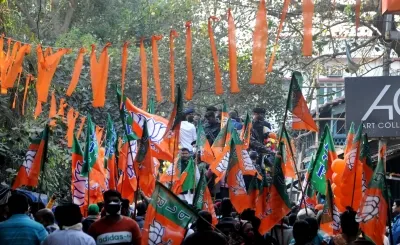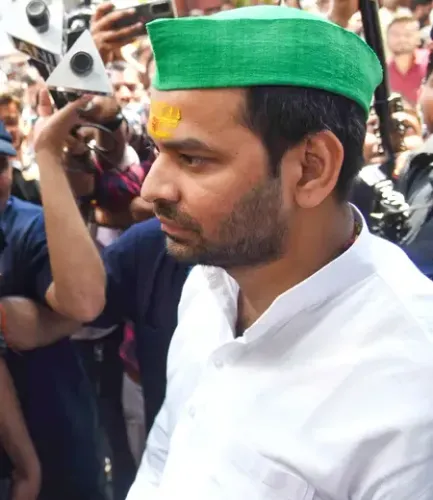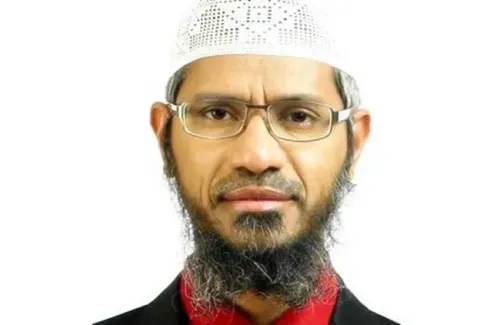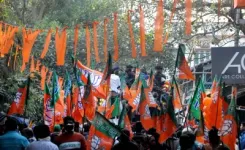How is Shravan Shivratri Celebrated with Devotion Across the Nation?

Synopsis
Key Takeaways
- Shravan Shivratri is a significant festival dedicated to Lord Shiva.
- Devotees perform jalabhishek as a mark of reverence.
- Major celebrations are held across various temples in India.
- The festival connects devotees with a rich spiritual heritage.
- Chants of 'Har Har Mahadev' echo throughout temple premises.
New Delhi, July 23 (NationPress) A surge of spiritual fervor enveloped the nation on Wednesday as worshippers flocked to Shiva temples to celebrate the revered occasion of Shravan Shivratri, engaging in 'jalabhishek' and offering heartfelt prayers.
On this profoundly significant day, devotees performed jalabhishek, the sacred act of pouring water over the Shivling. Pilgrims participating in the annual Kanwar Yatra collected holy Ganga water to present at temples, symbolizing their devotion.
Each Shiva devotee eagerly anticipates Sawan Shivratri, as it is deemed a special occasion to perform abhishek and express profound reverence for Lord Shiva.
Regarded as the second most significant festival honoring Lord Shiva, following Maha Shivratri, this event holds immense spiritual importance.
While the entire month of Sawan is dedicated to the worship of Lord Shiva, Sawan Shivratri occupies a unique position in the hearts of devotees, who believe that the prayers and rituals conducted on this day yield spiritual elevation and grant wishes.
The festival was celebrated with remarkable zeal and religious enthusiasm nationwide. Major Shiva temples across India organized special pujas and darshan for devotees. At these temples, Lord Shiva was ceremoniously anointed with sacred Ganga water.
The observance of Sawan Shivratri was particularly vibrant in northern states such as Uttarakhand, Rajasthan, Uttar Pradesh, Madhya Pradesh, Punjab, Himachal Pradesh, and Bihar.
In Uttar Pradesh, devotees began assembling from dawn to take a holy dip in the Saryu River. The Shiva temples along the riverbanks were lavishly adorned for the celebration.
Security measures were intensified statewide to ensure the festival proceeded smoothly. Long lines of devotees formed outside temples from the early hours.
In Varanasi, a large crowd of worshippers congregated at the Kashi Vishwanath Temple to offer their prayers.
"The faith in Kashi is truly boundless. I've longed to come here for ages, and now I've finally arrived. I had darshan of Mahadev, feeling incredibly blessed," shared a devotee.
Another devotee remarked, "We have been waiting here for four hours, but our enthusiasm remains high, and we will stay until we can enter the temple for darshan."
In Ghaziabad, numerous Kanwariyas arrived at the Dudheshwarnath Mahadev Temple to perform jalabhishek.
Speaking to reporters, Mahant Narayan Giri explained, "The significance of Sawan Shivratri lies in the legend of the Samudra Manthan. During this time, when poison surfaced, Lord Shiva consumed it. It is said that multitudes of gods performed abhishek on Lord Shiva. This tradition of offering jal at Dudheshwarnath has continued since ancient times."
In Prayagraj, devotees took a holy dip at the Sangam and utilized the sacred waters for jalabhishek rituals.
A devotee told IANS, "This is the Shivratri that occurs in the month of Sawan. On this day, Lord Shankar is offered jalabhishek and panchamrit abhishek. Each offering carries its own significance. Some offer oil, others use water, some utilize belpatra-infused water, while others use Ganga water. The type of abhishek depends on the devotee's wish and has various meanings."
In Uttarakhand, numerous devotees assembled at the historic Daksheshwar Mahadev Temple, believed to be the abode of Daksh Prajapati, the father of Goddess Sati, the first wife of Lord Shiva.
"We are here today at the Shiv Temple, considered the home of Lord Shiv's in-laws. It is believed that performing jalabhishek here pleases Lord Shiva. According to holy texts, Lord Shiva governs the world from this location, and we truly feel the divine presence," remarked a devotee.
In the national capital Delhi, the Kalkaji Temple also experienced a significant influx of devotees. An exquisitely adorned idol of Lord Shiva was set up, where worshippers performed jalabhishek.
Speaking to IANS, the Peethadheeshwar of Kalkaji Temple, Surendranath Avadhoot, stated, "The month of Shravan holds special significance for the worship of Lord Shiva. This year, Shravan Shivratri takes place on July 23. Devotees will perform jalabhishek at Shiva temples in their respective areas. The auspicious time (muhurat) for jalabhishek begins at 3:35 a.m., considered highly auspicious according to scriptures."
He further added, "During the Samudra Manthan (churning of the ocean), a dangerous poison emerged that threatened the universe. Lord Shiva consumed the poison to save creation, turning his throat blue and earning the name Neelkantha. The act of offering water to the Shivling is believed to honor Lord Shiva's sacrifice and help alleviate the pain he endured from the poison."
As the day progressed, the devotion continued to flow across regions, with chants of 'Har Har Mahadev' resonating throughout the temple premises.









